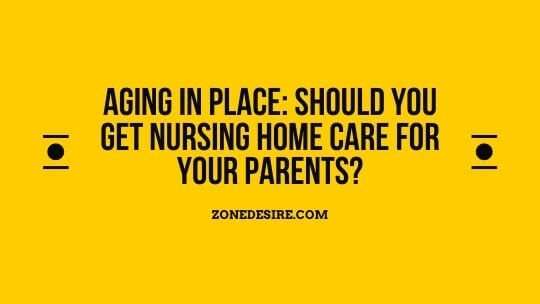Research shows over 70 percent of Americans who reach the age of 66 will be unable to care for themselves at some point. If you have aging parents, you want them to receive the best care available. This means you’re wondering whether a nurse for home care is the best option. You’re not alone. Globally, most people juggle between work, life, family, and taking care of an older person. However, managing all this can be demanding. This

1. Availability
We live in a busy world full of duties and responsibilities. This means you might not always be available when your parents need you. If you’re caregiving from far, choosing a nursing home specializing in aged care is the best option. These are qualified and trained experts who can evaluate safety risks and make corrections in the house. They have a wealth of experience when dealing with aged people.
2. Personal Attention
The nature of nursing home care allows your aging parent to be the primary focus. The caregiver channels their attention towards your aging parent. They must provide a level of care that ensures your loved one is comfortable. The caregiver can also interact with your parents and understand what they need. Choose a nursing home where your parent’s needs are met much faster. This ensures they’re not missing anything.
3. Diet and Nutrition Support
Is your aging parent getting the nutrition they need to stay healthy? Adults above age 65 are likely to be nutritionally at-risk. This can be lethal, especially if your loved one is suffering from a chronic condition. Issues like aging, illness, and bed rest can contribute to the loss of body mass. A nursing home has nutritionists who understand the requirements of older people.
4. Managing Medication
If your aging parent is on several medications, it can be challenging to manage. Nursing home care professionals can ensure the proper medication is being taken at the right time. The caregivers will ensure your parent takes their medication on time without fail. This helps control their health conditions. Additionally, this can eliminate harmful drug interactions. You won’t have to worry that your parents may miss or take the wrong medication.
5. Access to Social Circles

Your aging parent will have access to social opportunities they might not otherwise have. In a nursing home, your parents will be surrounded by peers in the same age-group. Most older adults find it convenient to have people their age to talk to. Giving them space where they can access their peers means they can deal with feelings of loneliness. They’ll interact more and smile more.
6. First-Hand Observation
Nursing home care professionals are well-trained in their areas. This means they can quickly note if something is amiss with a person. By assessing your parents’ changing needs, they can offer the best recommendation. Also, they’ll work with your parent’s home doctor to adjust their care plans appropriately. They can also note if there’s a change in the routine of your parent and advise accordingly.
7. Security
If your aging parent lives alone, they’re an easy target for burglars and thieves. While installing security alert systems is essential, a burglar could still sneak in and cut off the stream. Nursing care agencies are well-secured. They have the appropriate security systems to ensure occupants are safe and secure. The caregivers also receive training and evaluation to ensure they can provide the needed security and comfort.
8. Caring Companionship
A growing body of research shows that older people stay healthier with social interaction. A nursing caregiver can become a trusted friend for reading walks, games, movies, meals, and different social activities. At the nursing home, they have someone they can talk to about any issue they have. This creates a sense of companionship they wouldn’t otherwise get anywhere else.
9. You are doing the Best You Can
Being the sole caregiver for a parent is a big responsibility. Sometimes, you’ll need to make decisions about situations you’ve never encountered before. You also need to handle issues that seem to have no right or wrong answers. Once you choose a care decision, you must endure the consequences. Even though you’ve taken up a difficult choice, remember: you’re doing the best you can.
Your work doesn’t end when you enroll your aging parent into a nursing home. Your parents likely need your emotional support. Stay in touch and communicate regularly. You also need to make regular visits to the house. This ensures your parents feel required. A good nursing home will provide your parents with the care and engagement they need. This is a win-win situation for both you and your parents.
















